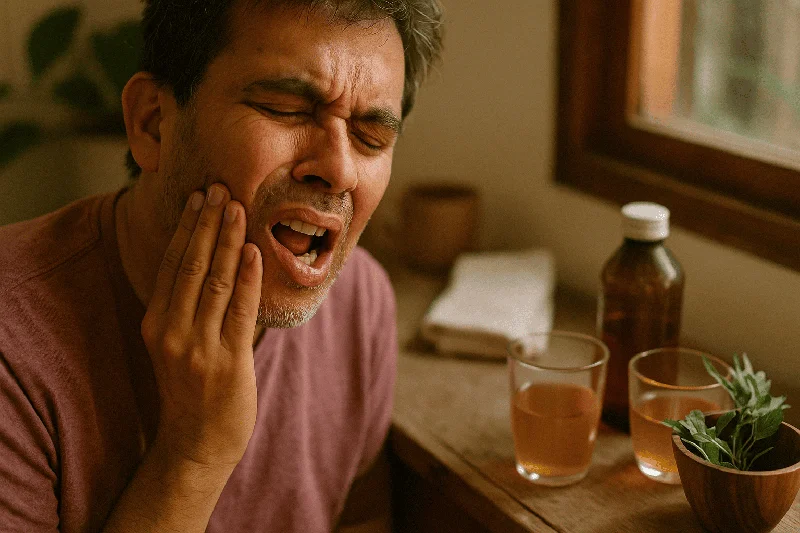Ask Ayurvedic doctor a question and get a consultation online on the problem of your concern in a free or paid mode. More than 2,000 experienced doctors work and wait for your questions on our site and help users to solve their health problems every day.
What Is Pyorrhea and How Can It Be Treated in Ayurveda?

Pyorrhea, or periodontitis or periodontal disease, is a severe and advanced form of gum disease. It involves inflammation and infection of the tissues surrounding and supporting the teeth, including the gums, periodontal ligaments, and alveolar bone. Pyorrhea can lead to tooth loss if left untreated. In Ayurveda, pyorrhea is generally referred to as “Danta Rakta Daha” or “Danta Mamsa Daha.”
Ayurvedic treatments for pyorrhea typically focus on maintaining oral hygiene, reducing inflammation, and promoting overall health. Regarding pyorrhea, Ayurvedic treatments aim to address the root causes of the condition and provide natural remedies to reduce inflammation, and infection, and promote oral health. Here are more details on the key aspects of Ayurvedic treatment for pyorrhea:
Herbal Remedies:
Neem (Azadirachta indica): Neem is often referred to as the “wonder herb” in Ayurveda and is known for its antimicrobial and anti-inflammatory properties. Rinsing the mouth with neem water or using neem-based toothpaste can help reduce bacteria in the oral cavity and soothe inflamed gums.
Clove (Syzygium aromaticum): Clove oil and powder are used in Ayurveda for their analgesic and antimicrobial properties. They can help alleviate pain and discomfort associated with pyorrhea.
Triphala: This herbal formula consists of three fruits, Amla, Haritaki and Bibhitaki. It’s known for its antioxidant and anti-inflammatory properties. Triphala can be used as a mouthwash to support oral health.
Don't wait or self medicate. Start chat with Doctor NOW
Oil Pulling:
Oil pulling known as GANDUSHA involves swishing a tablespoon of oil (commonly sesame oil) in the mouth for an extended period, typically 4-5 minutes. This practice is believed to draw out toxins, reduce harmful bacteria, improve overall oral hygiene, and provide strength to the teeth and gums.
Ayurvedic Diet:
Ayurvedic dietary recommendations for oral health include consuming foods that are rich in astringent and bitter tastes. These tastes help cleanse and tone the gums. Examples include leafy greens, pomegranates, and legumes. A balanced diet supports overall well-being and helps the body resist infections.
Proper Oral Hygiene:
Ayurveda advocates for regular and thorough oral hygiene practices. This includes brushing with a soft toothbrush, flossing to remove food particles and plaque, and using natural toothpaste or powders with herbal ingredients. Some Ayurvedic mouthwashes are formulated with herbal ingredients such as amla, licorice, or triphala. These mouthwashes can provide antimicrobial benefits and support gum health.
Lifestyle Modifications:
Stress management is considered crucial in Ayurveda as stress can affect overall health, including oral health. Practicing stress-reduction techniques like yoga, meditation, and relaxation exercises can be beneficial. Maintaining good digestion is also emphasized, as poor digestion can lead to toxins in the body that may contribute to oral health problems.
In conclusion, Ayurveda, with its ancient wisdom and holistic approach to health, offers remedies and practices for addressing pyorrhea, a severe form of gum disease. Ayurvedic treatments for pyorrhea emphasize natural solutions, including the use of herbal remedies like neem, clove, and Triphala, as well as practices like oil pulling and maintaining a balanced diet. Ayurveda encourages proper oral hygiene, stress management, and lifestyle adjustments to promote oral health. While Ayurveda can be valuable for preventing and managing pyorrhea, it is essential to consult with a qualified Ayurvedic practitioner for personalized guidance and a comprehensive treatment plan that aligns with Ayurvedic principles.
Book Online Ayurvedic Consultation with Indian Ayurvedic Practitioners
Ask-Ayurveda is a platform that helps connect patients with experts through Ayurveda online consultation with Indian Ayurvedic Practitioners to get proper treatments for their problems. Ask-Ayurveda offers consultations for health and lifestyle-related issues and provides appropriate measures and regimens to alleviate the issue. At Ask-Ayurveda, we offer Free Pre Consultation. For more details regarding Ayurveda reach out to our experts at Ask-Ayurveda.

